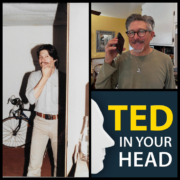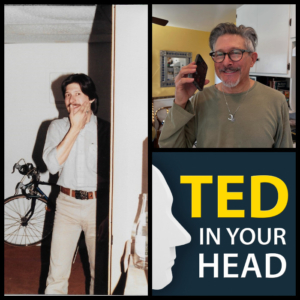 Are you super productive and proud of it? Do people tell you that you are always busy doing something? Great!
Are you super productive and proud of it? Do people tell you that you are always busy doing something? Great!
However, when you stop, slow down, or pause, do you feel anxiety, fear, or guilt? If so, you may have a hidden fear of slowing down or relaxing.
There is a term called Hurry Sickness, which is the feeling of being constantly rushed and stressed.
There is also such a thing called Doing Addiction: always needing to be doing something.
These are just two reasons why you might feel anxious, guilty and have great resistance to pausing, stopping, resting or relaxing. There are others.
In this episode, Ted talks about a fear that you might not even know you have. This fear can control you, push you, and create overwhelm, fatigue and illness. If there is something telling you that if you pause, relax or take time off it might create a catastrophe, then take the time to check out this podcast episode.
Please comment or review.
Listen to this podcast episode now:
Someone asked me recently “What’s your podcast about? Is it about hypnosis?”
I thought to myself, “It’s not really about hypnosis…”
That’s the tool that I use as a hypnotherapist to help people, but the podcast is not really about that. I had to sit down and think about and articulate what my podcast is about.
And so this is what I came up with:
In the Ted in Your Head podcast, we seek to liberate ourselves from the negative hypnosis of lack, limitation, and lethargy, and intentionally pursue a powerful path of personal transformation.”
So that’s what I’ve got. I meant it, I said it, and I’m here to represent it.
Speaking of hypnosis, as a hypnotherapist, I work in many different areas: anxiety, breaking bad habits, greater motivation etc. If you feel that you can use some support, you can reach out to me at TedMoreno.com/contact and request a complimentary phone consultation.
Let’s get into our topic of conversation, the hidden fear that you might have but don’t know it.
Let me begin by explaining that many people come to me for a lot of the same reasons.
- They’re overwhelmed.
- They’ve got too many things to think about
- They’ve got too many things to do.
- They’re highly stressed, and this is impacting their stomach or it’s keeping them from sleeping.
- They are experiencing anxiety, confusion, worry and uncertainty.
These are the kind of main things that people come to me for help with. And of course, hypnosis is the main tool that I use. It’s a powerful tool, and very effective. When somebody leaves my office, they feel better than when they walked in; more calm, more relaxed, more at ease. But in a typical hypnotherapy session, I also give my clients recommendations. Of course, one of the recommendations I give them is to slow down, take more breaks, get better sleep, sit outside, watch the sunrise, chill out a bit, right?
This is a good prescription, I think, for much of what ails us in our modern society. But lately, I’ve had a wave of clients coming in saying to me “I tried to do what you recommended. I tried to relax, I tried to take more breaks, but I noticed that when I slow down, I feel fear. I feel anxiety.”
They have a fear of slowing down, and that’s the hidden fear that I want to talk to you about today. It seems to be an epidemic these days, of people that are just afraid of slowing down, or when they stop or take a break or slow down, a lot of anxiety comes up. Why is that?
As I was doing the research for this podcast, I found two very interesting terms that I hadn’t heard before. The first one is hurry sickness. What is hurry sickness? It’s the feeling of being constantly rushed and stressed. It’s not a real sickness, but it is a condition that we can feel quite often. Obviously stress and worry is all mixed up in this hurry sickness.
“I’ve got to accomplish all these things. I’ve got to make this happen. I’ve got to do this, I’ve got to do that, got to take care of the kids, got to do the job, got to maintain the house!”
It’s that feeling of “I’ve got to, I have to, I’ve got to, I have to.”
The hyper awareness of time is another aspect of this: “Oh, look at the clock. I’ve only got so much time to accomplish this. Oh no, is it really 7pm already?”
Can you feel that in your body right now, as I describe it? The feeling that time is your enemy, and there’s not enough time to get stuff done, so consequently, there’s a fear of falling behind.
I had somebody call me just last night and say, I’m so busy. I’m really afraid of falling behind. I really need to catch up.”
What I told this person is that it’s important to understand that you’ll never catch up. You’re not going to at one point, lean back in your chair, put your feet up on the desk, and say, “Yay! I’m caught up. Everything is done!”
That’s not going to happen. Life is a constant progression of pushing stuff forward. That’s what life is, moving this thing forward, moving that thing forward and there’s always something to do. So fear of falling behind is an important part of this inability to just sit and stop and rest.
These three things: hurry sickness creating stress and worry, hyper awareness of time, and fear of falling behind; I would group all of these under the tendency to tie your self-worth to productivity.
The idea is that you are not a valuable person unless you are doing something. You’re not a good person unless you are productive. This is a problem because our value as human beings doesn’t come from what we do, but who we are, right? And yes, what we do may be in alignment with who we are, but we can get stuck in the cycle of just being productive for the sake of being productive due to the idea that if we’re not productive, then we’re lazy or not deserving of reward or prosperity or abundance, or whatever it is for you.
Of course, we derive value from being productive. It feels good to accomplish our goals, and it feels good to our self-worth when we earn money, take care of the family, and set important plans in motion.
However, we don’t want our self-value to depend exclusively on our productivity, that’s a huge mistake. I would suggest that you take time to examine your thoughts and see if that is indeed the case with you. Is that what’s stopping you from stopping or slowing down? Is that what’s keeping you from doing less and enjoying life more? I think that is a worthwhile thing think about, don’t you?
We’re talking about “doing addiction.” Doing addiction, that’s the second term that I read about that I hadn’t heard before, an addiction to doing. Why would we become addicted to doing?
To distract ourselves from negative emotions. We don’t want to feel negative emotions. We don’t want to feel grief, we don’t want to feel loss, we don’t want to feel anxiety, worry, uncertainty. We don’t want to feel lack of confidence or fear. So we distract ourselves by obsessively needing to do something even when we don’t need to.
Why do we call it an addiction? Because an addiction is something that we use to medicate ourselves, to not feel. It’s entirely possible that having to be busy all the time and not resting is a way to medicate ourselves to our feelings. If I’m busy, I’m always distracted. If I never sit down and feel what I need to feel, they I’m not vulnerable right? If I’m not productive, then somebody’s going to come and call me out on my laziness, etc., etc. It’s an addiction when you use it but can’t control it and you know it’s not working for you anymore.
This is an important thing to discuss, because the way to let go of negative emotions is to feel them.
If we are distracting ourselves from feeling our emotions, then we are repressing our emotions, and as I’ve discussed in previous podcasts, the downside of emotional repression could show up in the body as physical challenges or become overwhelming and lead to other mental health issues.
We need to be okay with feeling our feelings. And if when you stop or rest, feelings come up that you don’t want to feel, that’s a good sign that there’s something you need to pay attention to.
You might ask yourself: Where are these feelings coming from? What can I do about them to release them or resolve them?
There are many different ways to make this happen. However, it starts with recognizing that you have these emotions or feelings inside of you that you don’t want to feel, or that you’re avoiding.
Then, there may be a need for therapy or some intervention, or at the very least, attention and the intention not to avoid uncomfortable feelings.
Another reason that some people don’t want to stop, rest or slow down, may be due experiences of trauma and prolonged overwhelming stress, leaving their nervous systems in a state of hypervigilance which is the feeling of being constantly on guard.
It’s very common for people to be walking around in this constant state of what we might call hyper arousal, or hyper vigilance, the feeling that if you’re not always preparing, or on alert, something catastrophic is going to happen to you and you’re going to be caught off guard. You constantly feel the need to think and plan and focus, or something bad is going to happen.
This is typically a trauma response for many people, and for people that have experienced periods of intense prolonged stress.
Ultimately, there is a feeling of lack of control. We want to keep everything under wraps. We want to control how we’re feeling and to control how we’re feeling, we need to control everything out there. And guess what? You can’t control everything out there. You can control some things. I personally feel that you have no control over anything except the thoughts that you attach to but that’s a podcast topic for another time.
However, I think trying to control everything out there so that you can control what you’re feeling is a losing proposition, like a dog chasing its tail. Better to be ok with not always being in control.
So these are some things to think about. Ask yourself: “Do I have this hidden fear of slowing down, of resting, of stopping?”
Many people do and if you do, what can you do about it?
How can we address this fear of simply taking time to stop and smell the roses?
It comes down to a couple of things.
Recognize it. That’s the first step.
Admit to yourself: “Oh, I really feel anxiety when I stop. I really feel afraid when I’m not being productive.”
Recognize that, and if that’s something you want to change, then you can start working on it.
Start by practicing. We need to practice stopping or pausing. We need to feel what comes up. Notice it. Write about it. Talk about it in therapy or with somebody you trust or love, or with a counselor, whatever.
You might say: “So I’m productive and busy all the time and I don’t want to deal with my emotions and that’s fine with me.” Great! No problem.
But typically people that come to me don’t want to feel afraid of resting and stopping. They go on vacation and they can’t relax. They go to a party to have a fun, relaxing time with friends but can’t stay off their phones to work or deal with one thing or another. Or, they have incredible resistance to just spending time with others and taking it easy. For many people, that’s not how they want to live.
One of the ways that we can practice stopping or resting is through meditation. It can be difficult. Meditation is very hard for many people for that exact reason that they’re not used to stopping. They can’t stop. Their minds are like, blah blah blah chatter chatter chatter blah blah blah, right? But that’s why meditation is called a practice. We have to practice meditation.
Can’t figure out the meditation thing? How about taking some deep breaths, just practicing maybe two or three minutes of deep breathing? This is a way of stopping, a way of calming the nervous system, a way of resetting that hyper vigilance to a more calm, relaxed state.
Another important strategy is to schedule relaxation into your life. Schedule a day off, or maybe just half a day. For example, half of the day on Sunday, you’re not going to do anything, just sit and watch TV, read a book or play an instrument.
Positive affirmations can be very helpful as well and can be very, very powerful. Don’t underestimate the words that you say to yourself.
Positive affirmations might sound something like: “It’s okay if I take a break, it’s okay. If I take a day off, everything’s going to be okay. I’m still productive and valuable even if I take time off.”
If we have those affirmations and we’ve practiced them, then when a negative thought comes in, like “You’re being lazy for taking a break”, then you can challenge it. You can challenge it because you have this new language and a new way of being available to you.
I’ve discussed scheduling relaxation, however, time scheduling in general is fundamental to this equation.
Time scheduling is important so that you can be realistic about what you can accomplish. If you have a list of 100 things to do, and you start the day by looking at that list, that’s a losing battle right off the start, because you’re probably not going to be able to accomplish 100 things, and you’ll end up feeling stressed and bad about yourself at the end of the day.
Instead, focus on accomplishing eight or nine things that are the most important things you need to prioritize.
The key to being productive, in my view, is getting the most important stuff done first and if you have time left over, you take care of the minor stuff. This is where time blocking is very helpful. For example: “From 10 to 11, I’m going to do this. From 11 to 12, I’m going to focus on that. From 12 to one, I’m going to eat some lunch and maybe read or scroll through social media.
Finally, you can always seek professional help to get better at slowing down or stopping and getting more comfortable with relaxing. Seek professional help especially for trauma or past times of stress or loss or grief that you are having trouble managing on your own.
I work in many of these areas, and if that is something you’re interested in, you can reach out to me to get a complimentary phone consultation by going to TedMoreno.com/contact.
Is this a hidden fear you have that you didn’t know: the fear of slowing down or stopping? If your answer is “Maybe”, then check it out. Do some writing. Talk to other people, ask them what they think.
If it’s not something that you experience, if you’re fully able to rest, relax and slow down, then share this podcast with somebody that you think could benefit.
Or, leave a comment letting me know what you think.
Want to catch up on previous episodes? Click Here >
You can find me on Instagram and all the usual social media outlets. You can listen to this podcast on Spotify, Apple podcasts and Soundcloud.
if you want to watch this podcast as a video, go to YouTube @TedAMoreno.
Thank you for reading!
Ted








 In this episode, Ted discusses the desire to take his podcast in a new direction after almost 10 years of the Ted in Your Head Podcast. How to overcome anxiety, how to be more confident, how to let go of worry, these are good topics that Ted have been addressing but now he is asking the question: “How can we live life in a way that allows us to feel excited, inspired, energized and confident in the face of so many changes and challenges? How do we not only avoid falling into negativity and overwhelm, but more importantly, who do we need to be to maintain positivity and keep moving forward?
In this episode, Ted discusses the desire to take his podcast in a new direction after almost 10 years of the Ted in Your Head Podcast. How to overcome anxiety, how to be more confident, how to let go of worry, these are good topics that Ted have been addressing but now he is asking the question: “How can we live life in a way that allows us to feel excited, inspired, energized and confident in the face of so many changes and challenges? How do we not only avoid falling into negativity and overwhelm, but more importantly, who do we need to be to maintain positivity and keep moving forward?


 If you have the sneaky feeling that you are holding yourself back from taking the actions that lead to success, then there is a good chance you are engaging in self-sabotage. While some self-sabotage behaviors are easy to see, some are subconscious and therefore, hidden.
If you have the sneaky feeling that you are holding yourself back from taking the actions that lead to success, then there is a good chance you are engaging in self-sabotage. While some self-sabotage behaviors are easy to see, some are subconscious and therefore, hidden. 


 Does it seem like a lot of people around you are freaking out? Anxious about money, the economy, politics and the future? Is it even possible to maintain a peaceful vibe in the midst of all this anxiety? Yes it is possible and in this episode
Does it seem like a lot of people around you are freaking out? Anxious about money, the economy, politics and the future? Is it even possible to maintain a peaceful vibe in the midst of all this anxiety? Yes it is possible and in this episode 


 Ted has turned 65 years old and is reminiscing about his life: choices made, opportunities gained and lost, good times and bad times, trying to figure out Medicare…
Ted has turned 65 years old and is reminiscing about his life: choices made, opportunities gained and lost, good times and bad times, trying to figure out Medicare…